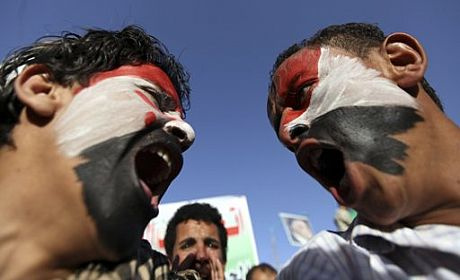A Kidnapped Revolution

Yemen’s National Dialogues are set to commence on March 18th, 2013, where 565 representatives of parties and civil institutions and experts will confer and consult with each other about the future structure of the country. Approximately 14 months have passed since the resignation of Ali Abdullah Saleh. The not very optimistic analysts who believed that the 2011 Arab uprisings could not be called revolutions can now look at Yemen. After gaining political and judicial immunity, the deposed dictator lives freely in the country and has become one of the major obstacles in changing the political structure of Yemen. His party still continues its work and has gained the majority of the seats in the National Dialogues. Foreign intervention has reached its climax, to the extent that the composition of the participants in the National Dialogues was rendered to Jamal bin Omar, the UN Secretary General’s envoy to Yemen. The majority of those who are supposed to decide about the future of Yemen are the elites of the former regime. The South, which is disappointed with the unity with the North, is threatened by disintegration. This is while during the 2011 and 2012 street protests, the people of Yemen displayed one of the most beautiful and peaceful popular demonstrations in the history of the Middle East with no ethnic, religious, or tribal inclinations. And in a society where carrying guns is legal and more than 60 million guns are in the hands of the people, the slogan of “salmiya“ (peaceful) became the major slogan of the people. But when the regime kneeled down and it was time to engineer power change, the unfinished popular revolution was kidnapped by Saudi Arabia and the armed parties affiliated with the Saudis. The Congress’ ruling party and the Salafi-Muslim Brotherhood “Islah“party, which were traditionally affiliated with Saudi Arabia, stained the revolution with blood and took to arms over their tribal disputes.
The Persian Gulf Cooperation Council, as the cover for Saudi Arabia’s interferences, entered the scene as a mediator. Ali Abdullah Saleh, with his usual stubbornness, gained political asylum from the Saudis amidst their mediations and delivered power to his deputy, Abd Rabbuh Mansur. He is supposed to establish the National Dialogues for holding elections and writing the new constitution, but the former deputy and the current interim president was not competent enough to bring calm to the torn country of Yemen.
The deteriorating Saudi diplomacy could not succeed, especially because the Saudi princes never sought development and peace in Yemen and are still committed to the will of their father, King Abdul-Aziz based on leaving Yemen in poverty. Nevertheless, the composition of the National Dialogues was determined with the intervention of the UN envoy and he was able to convince the Houthis and the southerners to participate in these talks. The participating parties in the National Dialogues must write their list in such a way that the share of the southerners would not be less than 50% in the end. The Saudi affiliated groups still have problems with the participation of the Houthis in the political future of the country. The interferences of Ali Abdullah Saleh have reached a point where even Abd Rabbuh Mansur has criticized the situation and demanded that Saleh temporarily leave the country.
The interim President of the country is still looking to, along with the Saudi media, link his own incompetence to the foreigners, particularly Iran. Every now and then, it is claimed in Sana’a that people or cargo in relation with Iran are arrested and discovered. But these claims are so baseless that even the Yemeni Prime Minister, Mohammed Basindawa, has not been convinced and, in an interview with al-Jazeera, he has stated that he is not aware of the authenticity of these reports.
Yemen’s major problem is being engaged in the inefficient diplomacy of Saudi Arabia and the drowning of the elites and political parties of this country in Saudi money. The Secretary General of the Persian Gulf Cooperation Council had recently surprisingly stated that if the southerners do not intend to remain within the framework of unity, they should not be forced to stay. Nevertheless, on March 18th, 2013, the National Dialogues will begin, but the obstacles facing the success of these talks remove any hope in this regard. The people of Yemen are faced with difficult days until they reach the shore of peace and the establishment of an independent and democratic regime.

